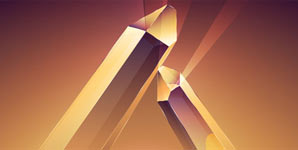Review of Glass Swords Album by Rustie
Rustie wants to do a lot of things at once. He wants to make you dance, but he also wants to make you stroke your chin. Sometimes he wants to make you do both at the same time, which is never a good look. He wants to reclaim tacky-sounding synths from puerile pop, but he also wants to make Serious Music. He wants to be as self-indulgent as he can get away with, but it also wants to create music which is, to some extent at least, concise and punchy. Those last two desires, in particular, are problematic: how on earth can a record embrace prog-dance excess while remaining reasonably accessible and direct? And yet (spoiler alert) it turns out that his new album can, just about, pull off this manoeuvre, which is a testament to Rustie's compositional skills. I imagine that most electronica boffins would have given up after a few frustrating hours of trying to navigate between the Scylla of unchecked progressive wankery and the Charybdis of hands-in-the-air naffness, but Glass Swords, the producer's first full-length record on Warp, avoids both hazards dexterously.

The key to the record's success is that things never get too baggy or loose; only one track goes past the four minute mark, and repeated listens make it apparent that each track has been carefully plotted and executed. This is something of a surprise, because the album initially sounds wildly, even exuberantly, chaotic. Genres come and go, whizzing past in a blur of unexpected stylistic shifts and rhythmic change-ups. You'll catch glimpses of dubstep and garage as well as the hallmarks of the leftfield electronic music Warp is associated most strongly with, but don't get too comfortable. Melodies vanish as quickly as they appear. Indulgent guitar solos suddenly develop out of nowhere. Synth lines emerge and sniff the air, their bright eyes gleaming and their bushy tails waggling, only to be abruptly chased back into the ground by a barrage of hard-hitting beats. Only gradually does the underlying sense of logic behind these shifts become apparent.
Nevertheless, and rather surprisingly, many of the tracks pack a direct, visceral punch. Rustie seems to have a taste for high-pitched, euphoric synth sounds (they may shift around restlessly and occasionally disappear, but nevertheless they dominate long stretches of the album) and pitch-shifted vocals, as on, for instance, 'All Nite'. He's not scared of snare rolls, and the bass often hits hard. As a result, Glass Swords often resembles a rather cheesy club album, but one which has been ripped apart and loosely sellotaped back together again, with many of the bits in the wrong place. Your opinion of the end result will be wholly dependent on the extent to which you're okay with kitsch and high-concept electronica coexisting on the same track. Even if you don't like it, though, you'll end up applauding Rustie's virtuoso performance: he's created an album which sounds like it could go horribly off the rails at any moment, but never actually does.
Nick Gale
Site - http://www.myspace.com/rustiebeetz
